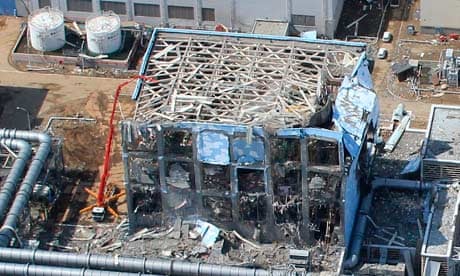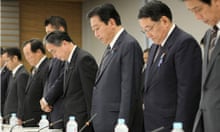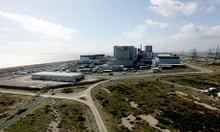Japan's prime minister at the height of the nuclear crisis has said he feared the country would collapse, and revealed that Tepco had considered abandoning the Fukushima Daiichi power plant after it was hit by the 11 March tsunami.
In candid interviews with Japanese newspapers, Naoto Kan, who resigned this month, said that at one point he believed the disaster could become many times worse than Chernobyl.
"It was truly a spine-chilling thought," he told the Tokyo Shimbun, adding that he foresaw a situation in which greater Tokyo's 30 million people would have to be evacuated, a move that would "compromise the very existence of the Japanese nation".
In the first week of the crisis Tepco played down speculation that fuel rods had melted after the quake and tsunami crippled the reactors' cooling systems. "The power was totally lost and there was no cooling capacity," Kan said. "I knew what that meant and I thought, 'This is going to be a disaster'."
His unease grew when his trade minister, Banri Kaieda, told him that Tepco was considering pulling its staff out of the plant and leaving it to its fate. "Withdrawing from the plant was out of the question," he said. "If that had happened, Tokyo would be deserted by now. It was a critical moment for Japan's survival. It could have been a led to leaks of dozens of times more radiation than Chernobyl."
Kan demanded an explanation from Tepco's then president, Masataka Shimizu, but "he never told me anything clearly".
Kan was also critical of Tepco's failure to immediately obey his order to vent one of the overheating reactors, prompting him to view the plant by helicopter the day after the tsunami.
"I went because we were not receiving accurate information," he told the Asahi Shimbun. "I felt I had to go there in person and speak to the people in charge or I would never have known what was going on."
Kan, whose handling of the crisis drew widespread public criticism, said Washington had also grown frustrated with his government's response.
"We were not told straight out, but it was obvious that they questioned whether we were really taking this seriously," he said.
Kan defended the gradual widening of the exclusion zone, and his conversion to a non-nuclear energy policy: "If there is a risk of accidents that could make half the land mass of our country uninhabitable, then we cannot afford to take that risk."



